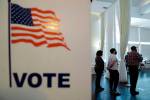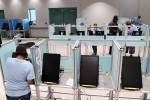Assessing the GOP presidential field
South Carolina triggered political shock waves and changed the dynamic of the 2012 presidential campaign by setting its Republican primary date for Jan. 21, likely pushing up the GOP presidential race to start shortly after the new year, or even earlier.
The Palmetto State chose its date after Florida set its primary for Jan. 31. Nevada has set its caucus for Jan. 14, and Iowa has tentatively agreed to hold its caucus on Jan. 3. Now all eyes are on New Hampshire, which prides itself on its customary first-in-the-nation primary.
The election calendar is shaping up to be front-loaded, just like in 2008 -- although many Republican leaders at the time vowed there would not be a repeat of that format.
What does all this mean for the candidates? Fundraising and grass-roots operations must be stepped up now, and primary presidential debates take on new importance with regard to swaying undecided Republicans and independents who vote in various January contests.
As I have traveled the country in the past year, I have found two camps -- the Romney camp and the anti-Romney camp. With New Jersey Gov. Chris Christie's decision not to be the new flavor of the day, coupled with former Alaska Gov. Sarah Palin opting out, we know the GOP nominee will emerge from the current crop of candidates.
Furthermore, it would seem the contest still will evolve into one between former Massachusetts Gov. Mitt Romney, who for now is poised to win New Hampshire, and whoever seizes the mantle of being the "anti-Romney" candidate.
Already, Texas Gov. Rick Perry has taken some damaging hits, including one for his choice of hunting grounds with a racially insensitive name attached to it. Romney and the other candidates (with the exception of Texas Rep. Ron Paul) deftly moved to the right of Perry on the hot-button issue of illegal immigration. Perry, who signed a bill granting in-state college tuition breaks to illegal aliens and opposes building a fence along most of the southwest border, is now perceived by many conservatives as weak on this important policy issue.
Former U.S. House Speaker Newt Gingrich is widely regarded as the most intellectual visionary of the GOP field. Successful businessman
Herman Cain of Georgia, an outsider who has never held public office, is building support (especially from the Tea Party constituency), although he earlier stumbled on foreign policy questions.
Another Tea Party favorite, Rep. Michele Bachmann of Minnesota, dropped in the polls after a botched response to Perry on a Texas issue regarding vaccines for children. Bachmann has worked extensively in Iowa and could conceivably stage a comeback, but it is unlikely.
Former Pennsylvania Sen. Rick Santorum has done well in the debates but desperately needs a second-place finish in Iowa or New Hampshire to stay alive.
Former Utah Gov. Jon Huntsman appears to be too liberal for a frustrated and right-leaning GOP electorate in the early states.
The main anti-Romney candidate could emerge by Florida. But if not, there is March 6, when as many as 15 states conduct a "Super Tuesday" primary. Romney's main opponent could be known by March 7, unless Romney really catches fire as other candidates drop out and he picks up new center-right support. Also, I do think the former governor of Massachusetts has the "next in line thing" going for him, as the GOP establishment loves to nominate the candidate who has paid dues and waited in the wings.
Cash remains king, because it enhances a candidate's sustainability for the long haul through March. So far, Romney is best-positioned as the cash king. But, of course, that could change. What many people don't realize is the struggling candidates will be eligible for millions of federal taxpayer dollars in January, which could fuel their efforts but also just help pay off campaign debts.
In any event, with President Obama now describing himself as an "underdog" for re-election -- especially due to his stunning loss of support from independents and young people -- Republicans seem to be feeling optimistic about their nominee winning in November 2012.
However, President Obama at this point isn't running against Republicans, he is running against reality. The nation's alarming debt, a deteriorating economy and high unemployment will be the big issues in the GOP campaign to defeat the president.
Deciding who best to address those issues are the decisions that loom before more and more Republican voters -- sooner than expected.
J.C. Watts (JCWatts01@jcwatts.com), chairman of J.C. Watts Companies, a business consulting group, is former chairman of the Republican Conference of the U.S. House, where he served as an Oklahoma representative from 1995 to 2002. He writes twice monthly for the Review-Journal.























